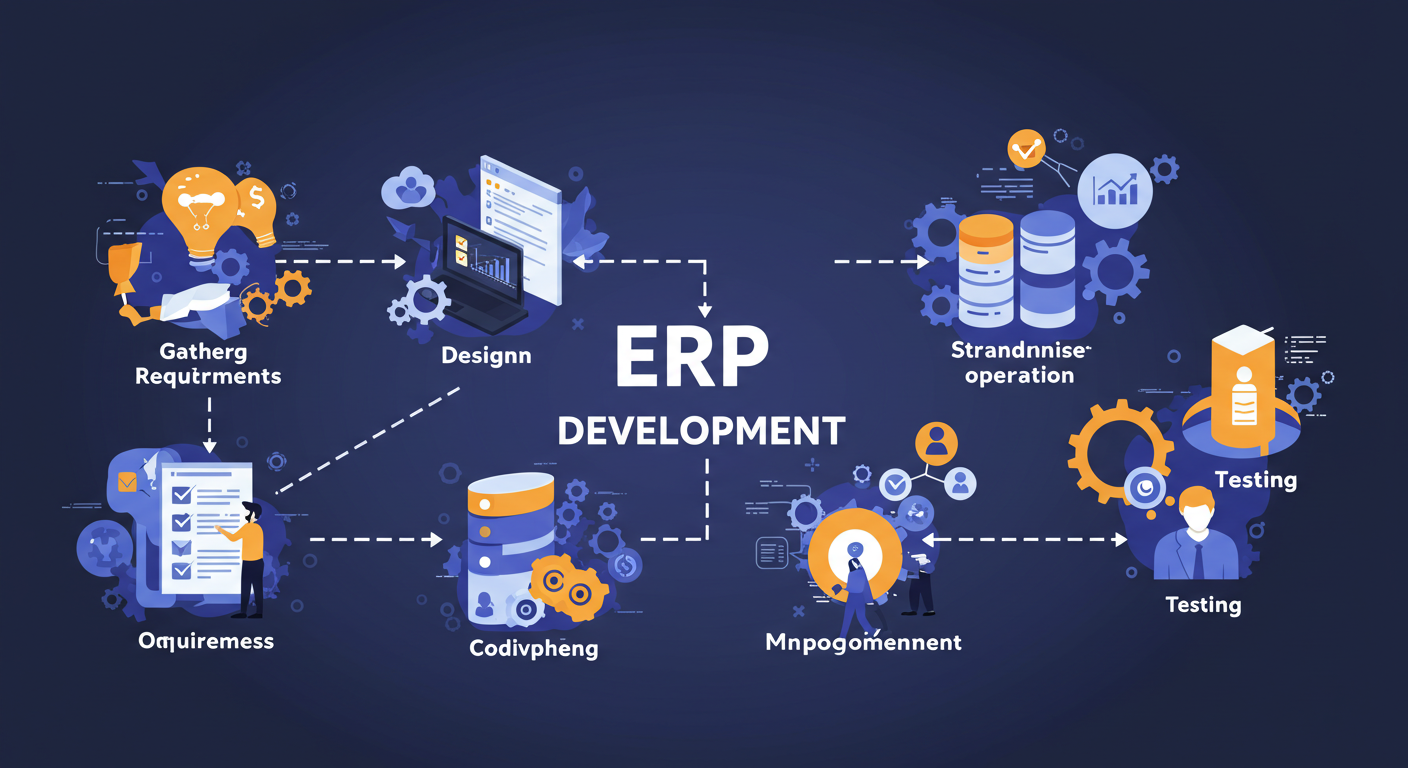In today’s fast-transcendent digital economy, businesses are searching for frequent efficiency, reducing operating costs and increasing productivity. One of the most effective solutions is Custom ERP development. Unlike off-the-chest ERP solutions, Custom ERP software is specially designed for your business processes, offering unmatched flexibility, scalability and long-term value.
In this article, we dive on what custom ERP development is, why it matters, its major benefits, development process, and business can successfully implement an analog ERP solution.
What is Custom ERP development?
Enterprise Resource Planning (ERP) is a system that integrates and manages the main commercial processes of a company such as finance, supply chain, human resources, sales and customer relationship management.
Custom ERP development refers to the ground to design and build an ERP solution, which corresponds to the unique workflows and requirements of a specific organization. Instead of adjusting its business processes to fit generic software, a custom ERP adapters to the operation of your company.
This ensures uninterrupted integration of operations, data stability in departments and improvement in decision making with real -time analysis.
Why Business selects Custom ERP development
Off-the-shelf ERP systems such as SAP, Oracle Netssuits, or Microsoft Dynamics provide standardized modules that work well for many organizations.
In contrast, strengthens businesses with complete control over development facilities, design, integration and scalability. This approach is ideal for organizations with unique business models, complex processes, or development plans that require a flexible system.
Key Benefits of Custom ERP Development
1. To your business needs
Every company has unique workflows. Custom ERP ensures that your system is built around your procedures, not in another way.
2. Scalability and flexibility
As your business grows, a custom ERP can easily develop with new modules and features. Off-the-shelf solutions often require expensive upgradation or replacement.
3. Long time cost efficiency
While the initial investment may be higher, the custom ERP reduces recurring licensing fees, eliminates unnecessary functionality, and reduces downtime caused by system boundaries.
4. Uninterrupted integration
Custom ERP systems can integrate with your existing applications – CRM, ecommerce platform, BI tools – can promote smooth data flow and centralized operations.
5. Increase in data security
Custom ERP software can be designed with advanced safety protocol to suit your industry, ensure compliance and protecting sensitive business data.
6. Competitive advantage
By streamlining operations and providing real -time insights, a custom ERP can give your company a significant edge over the rigorous, generic system relying a significant edge.
Custom ERP development process
Custom ERP development system involves several important stages:
1. Requirement analysis
Understanding its business goals, processes and challenges is the foundation. The stakeholders and ERP advisors collaborate to define the scope and must have features.
2. System design and architecture
Developers create an architecture that ensures scalability, safety and uninterrupted integration with your current system.
3. Module development
Modules are created for main commercial functions such as HR, Finance, Inventory, CRM, supply chain and reporting.
4. Integration
The ERP system is associated with the third-party application, database and API to unite data on the platform.
5. Tests
Extensive testing ensures performance, safety, and functionality before perfection.
6. Periphery
The ERP is rolled out throughout the organization, either stages (phased deployment) or all once (Big Bang approach).
7. Training and support
Employee ensures training adoption, while maintaining the reliability of the ongoing technical support system.
Challenges in Custom ERP Development
- High early cost-businesses should see ERP as a long-term investment that reduces operating cost over time.
- Periodically implementation-unique developers and project managers can accelerate distribution.
- Resistance to change – Proper training about the benefits of the system and help to customize employees.
- Complexity of integration – Ensure smooth API integration and data migration with efficient ERP developers.
Choosing the right partner for custom ERP development
The success of your ERP project depends largely on selecting the correct development partner. Here are some factors to consider:
- Experience and portfolio – Check their history of ERP projects in industries.
- Technical expertise – Ensure that they have strong knowledge of modern outline, cloud technologies and databases.
- Scalability – Partners with a team who can support future expansion and additional modules.
- Post-launch support-a reliable partner provides continuous updates, bug fixes and enhancements.
Future trends in custom ERP development
As technology advances, ERP systems are developing rapidly. Businesses planning ERP adoption should consider these upcoming trends:
- Cloud-based ERP remote enables access, scalability and cost saving.
- AI and machine learning provides integration-transactive analytics, automated decision making and better forecasts.
- The mobile provides on-a-go access to ERP-employees and managers.
- To add ideal equipment for industries such as IOT integration-manufacturing and logistics and to track operations in real time.

